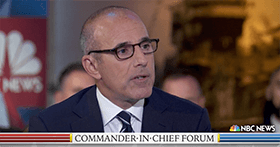 Matt Lauer’s performance as moderator at NBC News’s “Commander-in-Chief Forum” earlier this month was widely-panned. The “Today” show host’s failure to fact check Donald Trump’s claim he did not support the 2002 Iraq war ignited a debate from journalists on whether presidential debate moderators should be held accountable for fact-checking the candidates.
Matt Lauer’s performance as moderator at NBC News’s “Commander-in-Chief Forum” earlier this month was widely-panned. The “Today” show host’s failure to fact check Donald Trump’s claim he did not support the 2002 Iraq war ignited a debate from journalists on whether presidential debate moderators should be held accountable for fact-checking the candidates.
Fox News’ Chris Wallace said in an interview “it’s not my job” to fact-check candidates when he hosts the final presidential debate next month. “I’m not there to truth-squad,” he told his Fox News colleague Howard Kurtz.
Ari Fleischer, who served as White House press secretary for George W. Bush, penned an op-ed in The Wall Street Journal arguing “if moderators at the debates try to become live on-air fact checkers, they will fail in their one and only duty, which is to moderate a debate that allows the American people to decide which candidate they prefer.”
Wallace’s and Fleischer’s comments drew near-universal criticism from journalists.
“That’s bullshit. Fact-checking is job one for any reporter,” Politico chief political correspondent Glenn Thrush told Poynter’s James Warren in response to the backlash. “If journalists aren’t interested in being part of the truth squad, they should find another sport,” Washington Post media columnist Margaret Sullivan opined.
Wallace’s and Fleischer’s comments notwithstanding, there is certainly still a need for moderators to ask the candidates more probing questions and repeated follow-ups. But does that mean moderators are the best option for fact-checking the candidates?
““I’d rather trust PolitiFact or The Washington Post, which have done their homework and written in a nuanced way, than rely on a moderator making a decision in real-time,” Alan Schroeder, a Northeastern University journalism professor and presidential debate historian told the Columbia Journalism Review.
With fact-checking in real time, moderators also run the risk of being perceived as playing favorites. The bipartisan Annenberg Public Policy Center conducted a series of focus groups last year on presidential debate reform and the main complaint across age groups was that moderators “tend to take sides, giving one of the candidates the edge.”
While presidential debates should be about the candidates, it is imperative moderators do their homework and remember there is a journalistic component to their role—and such a thing as empirical fact. In the age of factcheck.org, PolitiFact, and 4 Pinocchios, moderators need to be prepared and aware of disputes about fact-checks and all the nuances.
-Scott Lessne
